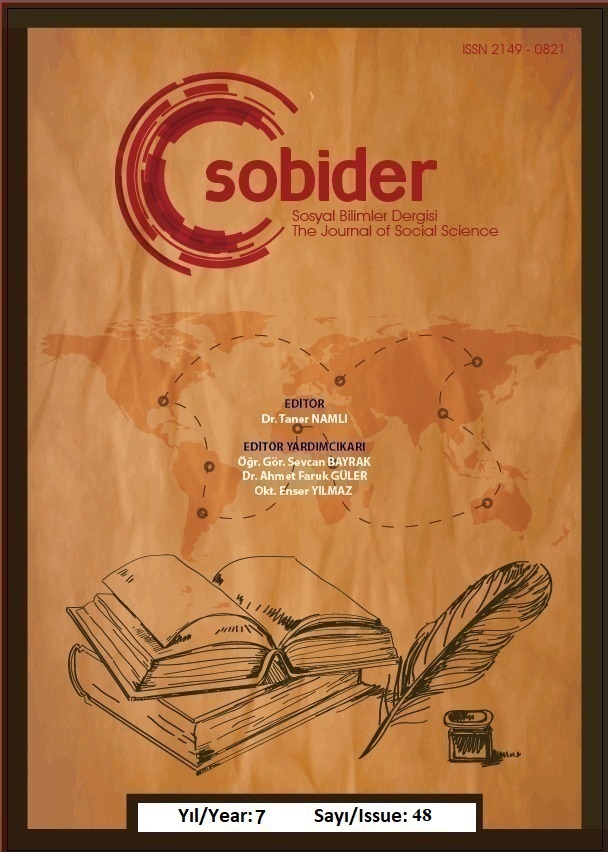Author :
Abstract
16 Mart 1964 tarihinde Türk hükümeti tarafından feshedilen Türk-Yunan İkamet, Ticaret ve Seyrisefain Sözleşmesi (1930) ile birlikte Türkiye’de yaşayan ve ticaret yapan, “gavur” olarak nitelendirilseler bile bir milli kimlik inşa eden Rum bireyler, vatan olarak belledikleri topraklardan zorunlu göçe tabi tutulurlar. Göç ettikleri yerde ise “Türk tohumu” diye ötekileştirilirler ve böylelikle milli kimlikleri yara alır. Buna karşın “yuva” olarak nitelendirdikleri yer hala İstanbul olarak kalır. Feshedilen sözleşme ve ardından yaşanılan olaylar, Türk ve Rum milli kimliği, dil, din ve ötekilik kavramlarının yeniden irdelenmesine sebep olmuştur ve aynı zamanda bu çalışmanın veri tabanını oluşturur. Çalışmanın örneklemi için Kayıp Vatan (Lost Homeland) belgeseli seçilmiştir ve milliyetçilik kuramları bağlamında incelenmiştir. Yaklaşım olarak ise metinlerarasılık kullanılmış ve betimsel yöntem tercih edilmiştir. Milliyetçilik literatüründeki milli kimlik, dil, din, vatan, ötekilik gibi temel kavramlar belgeseldeki veriler üzerinden değerlendirilmiştir.
Keywords
Abstract
On March 16, 1964 in conjuction with the Turkish government revoking The Convention of Residence, Commerce and Navigation (1930) Greek individuals who live and trade in Turkey, build a national identity even called “infidel”, are subjected to forced migration from the lands they consider as their homeland. Where they migrated, they are marginalized as "Turkish seed" and thus, their national identity is damaged. However, the place they call “home” still remains Istanbul. The revoked convention and the events that followed led to the re-examination of the concepts of Turkish and Greek national identity, language, religion and otherness and it also constitute the database of this study. Documentary Kayıp Vatan (Lost Homeland) was chosen for the sample of the study and was examined in the context of nationalism theories. As an approach, intertextuality was used and descriptive method was preferred. Fundemental concepts such as national identity, language, religion, homeland and otherness in nationalism literature were evaluated through the data in the documentary.
Keywords
- Aktulum, K. (2000). Metinlerarası İlişkiler. Ankara: Öteki Yayınevi.
- Anderson, B. (1995). Hayali Cemaatler. İstanbul: Metis Yayıncılık.
- Bulut, F. (2018). Metinlerarasılık Kavramının Kuramsal Çerçevesi. Edebi Eleştiri Dergisi, 2 (1), 1-19.
- Gellner, E. (1992). Uluslar ve Ulusçuluk. İstanbul: İnsan Yayınları.
- Hobsbawm, E. J. (2010). Milletler ve Milliyetçilik. İstanbul: Ayrıntı Yayınları.
- Kaliber, A. (2019). 1964 Rum Sürgünü Ve Kıbrıs Sorunu: Bir Ötekileştirme Siyaseti Olarak Dış Politika. İletişim.
- Kaymak, Ö. (2017). Atina’da Yaşayan İstanbullu Rumların Göç Hafızasıyla Beslenen Kimlik İnşaları. Contemporary Research in Economics and Social Sciences, 1 (2), 165-195.
- Özay, Y. (2019). Metinlerarası İlişkilerde Sözlü Yapıtların ve Sanatçıların Konumu Üzerine. Milli Folklor, 75, 164-173.
- Özkırımlı, U. (1999). Milliyetçilik Kuramları: Eleştirel Bir Bakış. İstanbul: Sarmal Yayınevi.
- Smith, A. D. (1994). Milli Kimlik. İstanbul: İletişim Yayıncılık.
- Yücel, H., Yıldız, S. (2014). İstanbul’da ve İmroz’da Rum Olmak, Atina’da Rum Kalmak. Alternatif Politika, 6 (2), 148-194.
